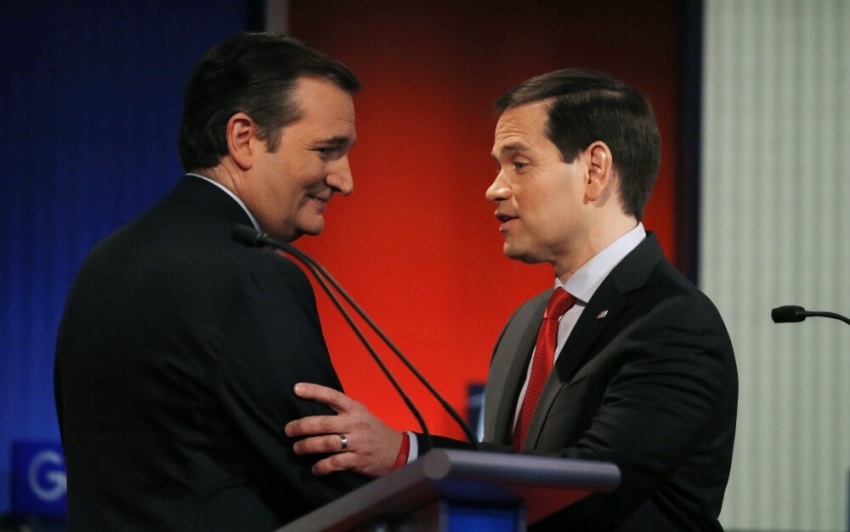The Split Between Ted Cruz Evangelicals and Marco Rubio Evangelicals: 5 Theories

Theory 4: Restoration vs. Reformation
Cruz evangelicals seek to restore an imagined past while Rubio evangelicals seek a reformed never-seen-before future.
This difference is even in their campaign slogans:
Cruz: Reigniting the Promise of America
Rubio: A New American Century
The first point to notice about these differences is that non-white evangelicals should relate more to Rubio's approach. When your ancestors were enslaved, discriminated against in employment and housing, or denied access to the voting booth, returning to America's past sounds unappealing.
(This is not to say that Cruz supporters are racist. If you're racist, you're probably supporting Trump.)
Cruz, on the other hand, is more consistent with the themes heard often by most conservative white evangelicals. These evangelicals also comprise a large voting bloc in Republican nominating contests.
These differences can also be found in their campaign strategies and the arguments they make to voters. Cruz says he can win the general election by getting Christian voters who didn't vote in previous elections to the polls. Rubio, on the other hand, says he can win by bringing new voters who aren't traditionally Republican to the polls. The difference, in short, is between mobilizing non-voters and mobilizing former Democrats.
Theory 5: Religious Accommodation vs. Religious Acknowledgment
In The Divided States of America (2007), Dr. Richard Land, president of Southern Evangelical Seminary and executive editor of The Christian Post, describes three views of church-state separation: avoidance, acknowledgment and accommodation.
The avoidance position says all forms of religious expression should be banned from government property. The acknowledgement position says America's Christian heritage should be given a privileged position on government property. And the accommodation position says all religious groups should have the same access to government property; government property can provide space for religious displays but the displays are paid for by the religious groups. Land supports the accommodation position.
Cruz evangelicals tend to be acknowledgmentists while Rubio evangelicals tend to be accomodationists. David Barton and James Dobson are among the leading proponents of the acknowledgment view.
Jerry Falwell Evangelicals vs. Billy Graham Evangelicals?
Russell Moore, president of the Southern Baptist's Ethics & Religious Liberty Commission, generated some consternation among Cruz supporters last month for his description of the differences between the evangelical supporters of the top three candidates. In an interview with Roll Call, he said, Cruz leads the "Jerry Falwell wing" while Rubio leads the "Billy Graham wing" and Trump leads the "Jimmy Swaggart wing."
The description is fairly close, if one just needs a shorthand understanding of the differences between Cruz, Rubio and Trump's evangelicals supporters. It can be improved, however.
In reality, Graham's influence on the evangelical movement is so deep and wide that every evangelical today is, in a sense, a "Billy Graham evangelical." Also, Falwell's influence peaked in the 1980s and the Christian Right has changed much since he was its standard bearer.
Rather than saying Cruz leads the "Jerry Falwell wing" and Rubio leads the "Billy Graham wing," a better description is that Cruz leads the "Tony Perkins wing" and Rubio leads the "Russell Moore wing."
As mentioned above, Perkins endorsed Cruz, plus he's a political (rather than pastoral) leader more aligned with the restoration and acknowledgment views.
Though the alignment isn't perfect, Rubio's language and approach to politics is more attuned to Moore's vision of evangelical political engagement. While Moore can be considered a political leader, as head of the Southern Baptist's public policy arm, he has also been a pastor and theology professor. Plus, they co-authored a Washington Post op-ed.
Of course, don't expect Moore to put it this way. Russell Moore is too close to Russell Moore to recognize a Russell Moore evangelical. Plus, it would sound too much like an endorsement, something Moore will not do.
Bonus: The Quick and Easy Way to Tell a Rubio Supporter
If you hear an evangelical that uses the word "winsome" a lot to describe how Christians should behave in the public square, they're probably a Rubio supporter. They love that word.
Sometimes they'll even use that word to describe their favorite candidate.
For example:
Wayne Grudem: "Rubio is a winsome, likable candidate who has the best chance of soundly defeating Hillary Clinton."
Eric Teetsel: "Marco's winsome message and vision for a new American century appeals to citizens from across the political spectrum."
Two Important Caveats
1) None of these theories alone are sufficient. Exceptions can be found to all of them. Taken together, however, they provide a robust understanding of the differences between Cruz and Rubio evangelicals.
2) Evangelicals supporting Cruz and evangelicals supporting Rubio agree more than they disagree. These theories highlight differences because those differences are important when choosing a Republican presidential nominee. But on the big questions that split Republicans and Democrats, these evangelicals will more often unite than divide.



























